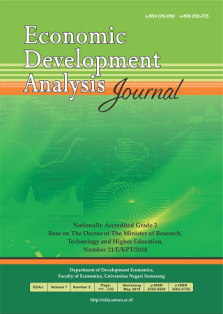Dynamic Linkage Among Population, Urbanization, Poverty and Indonesian Economic Growth
Abstract
Indonesia has confronting economic challenges due to many factors such as uncontrolled population and urbanization, among others. It is therefore essential to examine such variables that may take essential roles in determining economic growth. In doing so, this study empirically examines the dynamic linkage between population, urbanization, poverty, and economic growth in Indonesia using a Vector Error Correction Model (VECM) to capture the short and long-term relationship. The research involved data between 2000 and 2020 from the Worldometer and World bank data. The empirical results indicate that the inclination of population growth and urbanization rates have a negative impact on Indonesian economic growth. Conversely, the poverty rate that continues to rise impacts increasing economic growth in Indonesia. This study also concludes that in the long and short run, there are indications of the nexus between the variables of economic growth population growth, urbanization, and poverty level. The research suggests coordination between parties to manage population growth and urbanization with the planning of economic strategies. The government is directed to continually provide censuses to control the urbanization and population among Indonesian


